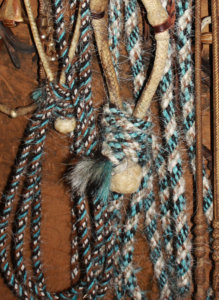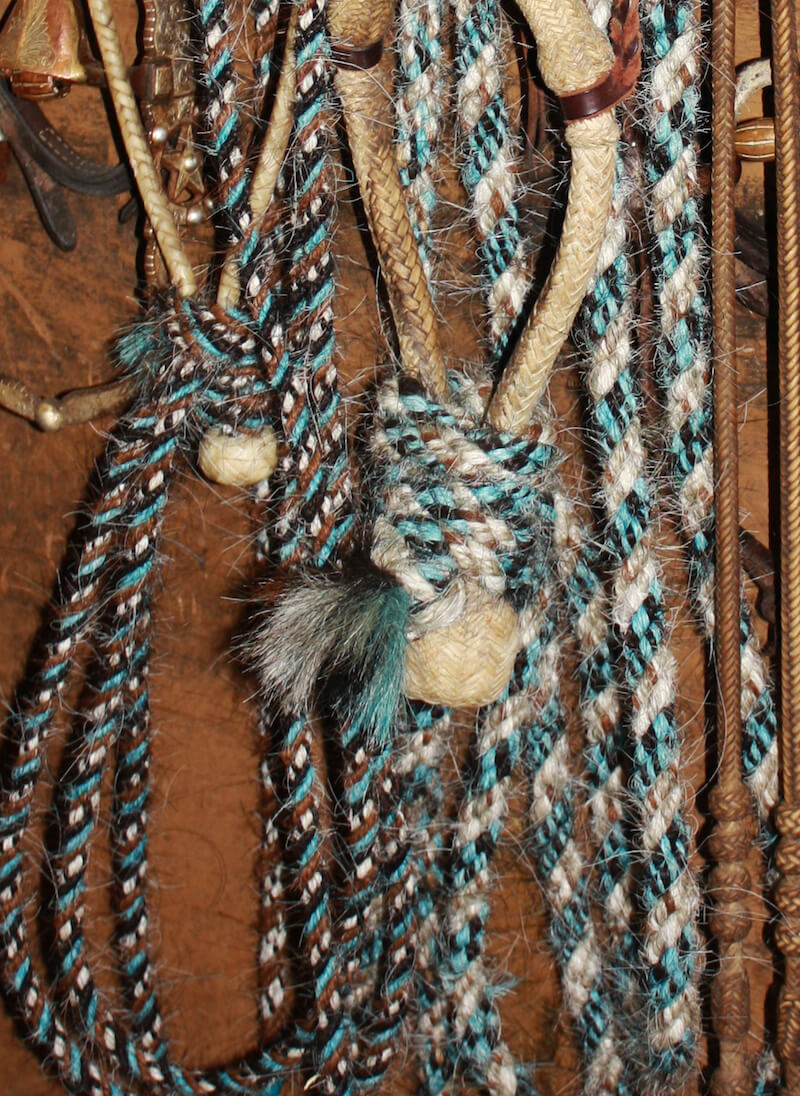A Colorful Cowgirl Mixes Fashion and Tradition
by Allison Trimble
One of my favorite things about the cow horse industry is that it is rooted in tradition: from the training, to the people, to the tack and equipment. I marvel at the skill of rawhide braiding for romel reins and hackamores; I am even more enamored with the art of horse hair twisting that is done to make mecates.
Traditional mecate reins—pronounced either “muh-caw-tee” or “McCarty”—are made from horse hair, but can also be made from mohair (long-haired goat wool). Mecate literally means “horse hair rope” in Spanish. The mecate in cow horse competition is used tied to a bosal, either alone or in a two-rein setup in conjunction with a spade bit and romels. The two-rein mecate is smaller in diameter than the mecate rein used alone in a hackamore setup. It is also somewhat common to see a mecate used with a snaffle bit, though not often in cow horse competition.
One end of the mecate has a “morta” or a knot that has a cluster of horse hair tassel, and the other end has a leather popper. The mecate reins are typically 10-24ft and are fashioned in a loop with a lead portion that is then either tucked into the belt loop or tied around the saddle horn. Mecates make a great rein. If taken care of they will last a very long time as well as helping to teach your horse to stay between the reins because of the tickle from the horsehair when laid against the neck.
Even more interesting than the history and use of the mecate is the tradition behind the people who twist them. Gloria Keys, also known as The Colorful Cowgirl, is a fourth generation mecate twister. There is a science to twisting the mecate so it has just the right tension and feel. This art has been passed down to her from the women in her family. When asked what to look for in a mecate, Gloria said that evenness of the twist is important but that the feel of a mecate is a personal preference. Some people prefer a tighter feel, others a loose feel.
Most mecates are made out of tail hair, but the advantage to having a mecate made out of mane hair is that they last longer and don’t get as stiff and unruly in moist weather. Some mecates have a core, a horsehair strand inside the mecate that the hair is twisted around. Gloria says that a core gives a heavier feel to the rein and in the horse’s mouth and can also make the mecate stiff in moisture. Her family’s tradition does not use a core in their mecates because they like a lighter feel.

Gloria grew up the daughter of a mecate twister’s daughter on a Northern Nevada ranch. As a young adult, after moving to the city to pursue a corporate career, she realized that city life was not for her. She had a wonderful family tradition to carry on but wanted to make it her own. Mecates are traditionally mixtures of hair color found naturally on a horse. Gloria carved out a niche for herself by taking white mane hair and dying it a variety of colors. The result is a lively-colored piece of useable artwork. As a girl she was fondly called a “colorful cowgirl” because she was known to wear purple, red and turquoise Wranglers and colorful shirts to match while out working and riding on the ranch. It seemed a perfect fit and inspiration for her mecate business.
“I love it because I can live anywhere and do my business from home, ride my horses when I want, and have fun creating beautiful masterpieces for people to enjoy and use. It’s so much fun to come up with different colors and color combinations,” says Gloria. “I love creating things and seeing the inspiration they bring to others.”
I love Gloria’s work and enjoy the creativity and individuality in each handmade mecate. Recently I sported both a hackamore mecate and a two-rein mecate at the NWRCHA Show in Lynden, WA. I look forward to having a large collection of The Colorful Cowgirl’s creations in my tack room. For more information visit www.thecolorfulcowgirl.com.
Published June 2012 Issue

Allison Trimble is a Realtor® specializing in equestrian properties, farm and ranch properties, and residential real estate. As a former horse trainer, and a current owner, breeder and non-pro competitor in cow horse and reining events, she combines her experience in the horse industry with her lifelong real estate expertise to guide her clients through the real estate process.
Learn more at www.coastalrealtywa.com

